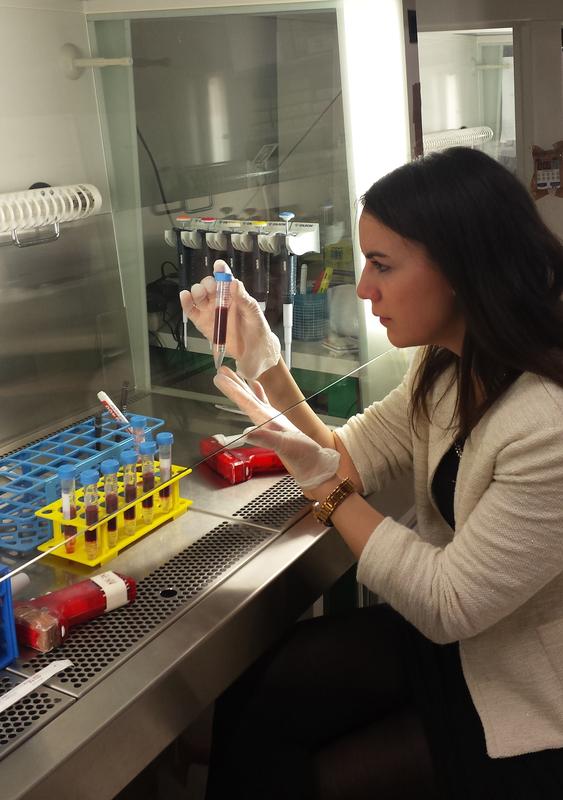

Dagmar Gotthardt and her colleagues have shown for the first time ever that NK cells produce a factor called VEGF-A that promotes tumor growth.
(Photo: Petra Kudweis)
Researchers from the Vetmeduni Vienna have now discovered that NK cells can switch and promote tumor growth, with STAT5 acting as the key regulator.
NK cells require active STAT5 to kill tumor cells; however, when STAT5 is absent or inhibited, NK cells do the opposite: they accelerate cancer progression by promoting angiogenesis. Drugs targeting STAT5 may therefore boost tumor growth. The study was published in the high-impact journal Cancer Discovery.
The immune system protects the body against cancer cells. The Elimination of cancer cells is an important task of NK cells. For NK cells to function properly, they require the activator STAT5.
Dagmar Gotthardt, Veronika Sexl and colleagues from the Institute for Pharmacology and Toxicology at Vetmeduni Vienna have shown that NK cells that lack STAT5 promote the growth of cancer cells. “You can imagine STAT5 like an on/off switch. When STAT5 is present, it stimulates NK cells to act against cancer cells. If STAT5 is absent, NK cells do the opposite and incite the cancer cells to grow,” explains Gotthardt, the first author of the study.
STAT5 inhibition is the treatment of choice for many types of cancer
STAT5 is highly active in many forms of cancer such as pancreatic cancer, liver cancer and leukaemia. Drugs that inhibit STAT5 are a great hope for the treatment of many different tumor types. Gotthardt and her colleagues now call this strategy into question.
“These inhibitors not only target cancer cells but may also have a negative impact on the immune system and NK cells. They could promote the progress of the disease. That would be a dangerous cocktail for patients,” Gotthardt says.
For the first time ever, the researchers have shown that NK cells produce a factor called VEGF-A (Vascular Endothelial Growth Factor A) that promotes tumor growth. A number of different experiments have shown that STAT5 is required for the killing of tumor cells and normally suppresses the production of VEGF-A in NK cells.
If STAT5 is inhibited, VEGF-A is produced in high amounts leading to increased tumor progression. The results are of clinical relevance: One of the inhibitors that formed part of the study is already in clinical use.
Service:
The article „STAT5 is a key regulator in NK cells and acts as molecular switch from tumor surveillance to tumor promotion”, by Dagmar Gotthardt, Eva M. Putz, Eva Grundschober, Michaela Prchal-Murphy, Elisabeth Straka, Petra Kudweis, Gerwin Heller, Zsuzsanna Bago-Horvath, Agnieszka Witalisz-Siepracka, Abbarna A. Cumaraswamy, Patrick T. Gunning, Birgit Strobl, Mathias Muller, Richard Moriggl, Christian Stockmann and Veronika Sexl was published in Cancer Discovery. doi: 10.1158/2159-8290
http://cancerdiscovery.aacrjournals.org/content/early/2016/02/16/2159-8290.CD-15…
About the University of Veterinary Medicine, Vienna
The University of Veterinary Medicine, Vienna in Austria is one of the leading academic and research institutions in the field of Veterinary Sciences in Europe. About 1,300 employees and 2,300 students work on the campus in the north of Vienna which also houses five university clinics and various research sites. Outside of Vienna the university operates Teaching and Research Farms. http://www.vetmeduni.ac.at
Scientific Contact
Univ.-Prof. Veronika Sexl
Institute of Pharmacology and Toxikology
University of Veterinary Medicine, Vienna (Vetmeduni Vienna)
T +43 1 20577-2910
or
Dagmar Gotthardt. PhD
Institute of Pharmacology and Toxikology
University of Veterinary Medicine, Vienna (Vetmeduni Vienna)
T +43 6605248399
dagmar.gotthardt@vetmeduni.ac.at
Released by:
Susanna Berger
Science Communication / Corporate Communications
University of Veterinary Medicine Vienna (Vetmeduni Vienna)
T +43 1 25077-1153
susanna.berger@vetmeduni.ac.at
http://www.vetmeduni.ac.at/en/infoservice/presseinformation/presseinformationen-…












